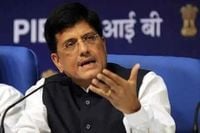India and Belgium are taking significant steps to enhance their bilateral relationship, focusing on trade, industrial collaboration, and strategic investments. During a recent visit to Brussels, Indian Commerce and Industry Minister Piyush Goyal met with Belgian Minister of Defence and Foreign Trade Theo Francken and Minister-President of the Flanders region Matthias Diependaele. The discussions, held on May 2, 2025, aimed at strengthening ties in various sectors including semiconductors, clean energy, defence production, and pharmaceuticals.
According to a statement from the Commerce Ministry, the talks underscored the growing economic synergies between the two nations. "The discussions highlighted growing economic synergies and focused on scaling bilateral trade, fostering industrial collaboration, and deepening investments in strategic sectors such as semiconductors, clean energy, defence production, and pharmaceuticals," the ministry noted.
Belgium stands as India’s fifth-largest trading partner within the European Union, with bilateral trade reaching an impressive $15.07 billion in the fiscal year 2023–24. The relationship has been further bolstered by Belgian foreign direct investment (FDI) in India, which has totalled $3.94 billion from April 2000 to September 2024. Notably, $1.1 billion of this investment reflects a remarkable 39% growth in the past year alone.
During the meeting, Goyal emphasized India's role as a reliable economic partner for Europe. He stated, "India is not just a market of the future – it is a collaborator of trust." This statement reinforces India's commitment to being a key player in global economic dynamics, particularly as it continues to rise as one of the world's fastest-growing major economies.
The discussions also reviewed the progress of the EU-India Free Trade Agreement (FTA) negotiations, with both parties recognizing the importance of addressing tariff and non-tariff barriers to enhance market access. The Flanders region was highlighted as a crucial partner due to its advanced manufacturing ecosystem and strategic role as a European gateway.
These talks follow the recent visit of Princess Astrid of Belgium to India in March 2025, which highlighted the shared ambition to unlock new avenues for collaboration in various sectors, including trade, technology, defence, agriculture, life sciences, innovation, skilling, and academic exchanges. The over 300-member Belgian Economic Mission led by Princess Astrid has injected fresh momentum into this dynamic bilateral relationship, paving the way for deeper cooperation.
Both sides reaffirmed their commitment to building on this momentum to forge resilient, future-focused ties that enhance mutual growth and contribute to a more integrated global economic framework. The ongoing collaboration reflects the expanding depth and strategic nature of the Indo-Belgian economic relationship.
Goyal's remarks during the visit also touched upon India's transformative economic journey over the past decade, emphasizing reforms that have empowered citizens and entrepreneurs alike. He remarked, "The last eleven years have not only been about economic upliftment, but about enabling aspirations." This perspective highlights the significant changes that have taken place in India’s economic landscape, which is now characterized by a young, aspirational population and a dynamic reform-oriented environment.
As India continues to position itself as a key player in the global economy, the partnership with Belgium is expected to evolve further, focusing on sectors such as defence manufacturing, green hydrogen, nano-electronics, nuclear medicine, and pharmaceutical R&D. These areas not only represent significant economic potential but also reflect the strategic interests of both nations.
In conclusion, the recent discussions between India and Belgium mark a pivotal moment in their bilateral relationship, showcasing a mutual commitment to fostering economic growth and collaboration in key sectors. As both countries navigate the complexities of the global economic landscape, their partnership is poised to yield significant benefits, not just for their respective economies but also for the broader international community.




